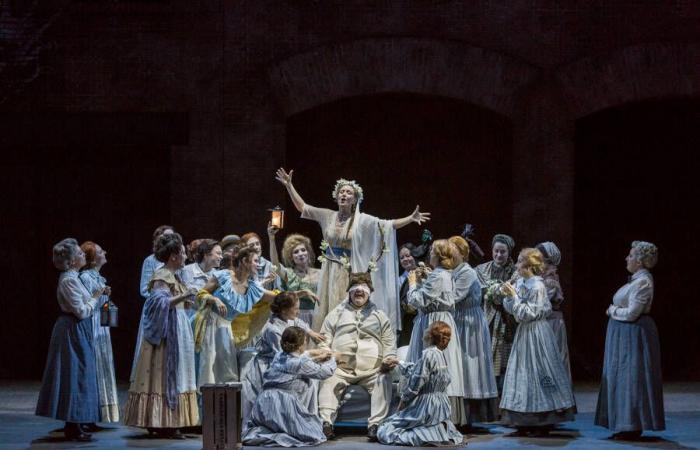It is with Falstaff staged by Dominique Pitoiset that the new season of the Opéra Bastille opens. Created a quarter of a century ago, this production, revived many times, shows no signs of age, no doubt because it remains faithful to the libretto even if the action was transposed to the end of the nineteenth century, as evidenced by the costumes ofElena Rivkinain particular the dresses of the female characters, particularly becoming, and the presence on the stage of a superb vintage car. The unique set consists of large sliding panels that occupy the back of the stage and represent in turn the facade of the Garter Inn and that of Ford’s home, the entrance to Windsor Park and a garage. All the action takes place outdoors. During the last scene, the great Herne Oak is an image projected on the facades in a bluish light. On the stage are scattered various accessories useful for the action, table, armchairs, screen and of course a large laundry basket in the first act. The direction of the actors, alert and precise, is perfectly readable.
Next to the two veterans Ambrogio Masters et Marie-Nicole Lemieux who have already performed their roles in loco in 2013, the OnP has hired no fewer than five young singers who are making their debuts – some of whom are promising – on our first national stage: Nicholas Jonesmember of the lyrical troupe of the Paris Opera and Alessio Cacciamanieasily hold their own in the roles of Bardolfo and Pistola. Ivan Ayon-Rivas plays a good-natured Fenton with a clear, well-projected voice. Alongside him, Federica Guidewhose vocal breadth and length of breath immediately capture attention, embodies a willful Nanetta who does not let herself be told. However, one would have wished for slightly more ethereal and diaphanous high notes on the recurring phrase “Anzi rinnova come fa la luna.” The Ukrainian baritone Andrii Kimach has solid means and good projection. Despite a singing lacking in nuances and a timbre with limited seduction, his grumpy and angry Ford remains convincing in all circumstances. Finally Olivia Boenwhose clear and homogeneous voice easily passes the stage, draws a delicate portrait of Alice Ford. Both cunning and self-confident, her heroine would benefit from being a little more cunning. The American soprano nevertheless receives a well-deserved ovation at the final curtain.
Gregory bonfatti is a sonorous Doctor Caius, as for Marie-Andrée Bouchard-Lesieur .et Marie-Nicole Lemieuxthey happily complete the group of gossips. The first thanks to her delicately fruity timbre, the second thanks to her eloquence and mastery of a role that she has included in her repertoire for many years and that she embodies with undisguised relish and an irresistible vis comica. The Quebec contralto has the opulent low notes that the score demands and her voice succeeds in passing the ramp in the great ship of Bastille. Finally Ambrogio Masters is the great triumphant of the evening. The Italian baritone on whom time seems to have no hold is certainly one of the best current Falstaffs. For many years he has taken his “Pancione” to the greatest stages and refined his interpretation which remains a model. Funny without being caricatural, willingly moving as shown by his aria “Va, vecchio John” at the beginning of the third act, he easily dominates the stage.
All these fine people are led with great fanfare by the lively and nervous baton of Michael Schønwandt which offers an eminently theatrical direction applauded by the audience after the intermission and at the final bows. Finally, let us salute the remarkable performance of the choirs in the fugue which concludes the work, smoothly conducted.






